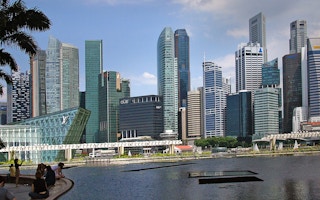Nigeria, Singapore and India are among countries fuelling the gap between the super-rich and poor, aid agency Oxfam said on Tuesday as it launched an index spotlighting those nations doing least to bridge the divide.
South Korea, Georgia and Indonesia were among countries praised for trying to reduce inequality, through policies on social spending, tax and labour rights.
Oxfam said inequality had reached crisis levels, with the richest 1 percent of the global population nabbing four fifths of wealth created between mid-2016 and mid-2017, while the poorest half saw no increase in wealth.
The index of 157 countries is being released as finance ministers and central bank chiefs gather in Bali for the World Bank and International Monetary Fund annual meetings.
Nigeria, where 10 per cent of children die before their fifth birthday, came bottom due to “shamefully low” social spending, poor tax collection and rising labour rights violations, Oxfam said.
It said tackling inequality did not depend on a country’s wealth, but on political will.
Singapore, one of the world’s richest countries, came in the bottom 10, partly because of practices which facilitate tax dodging, Oxfam said. The city state, which has no universal minimum wage, also did poorly on labour rights.
South Korea, 56 on the list, was praised for bumping its minimum wage up by 16.4 per cent last year, and Georgia (49) for boosting education spending by nearly 6 per cent - more than any other country.
“
We see children dying from preventable diseases because of a lack of healthcare funding while rich corporations and individuals dodge billions of dollars in tax.
Winnie Byanyima, executive director, Oxfam
Denmark’s track record on progressive taxation, social spending and worker protections earned it the top spot, but Oxfam warned that recent administrations had eroded good policies and inequality had risen.
China (81) ranked way ahead of India (147), devoting more than twice as much of its budget to health and almost four times as much to welfare spending, the agency said.
Oxfam warned that world leaders risked failing on their pledge to reduce inequality by 2030 and urged them to develop plans to close the gap which should be funded by progressive taxation and clamping down on tax dodging.
“We see children dying from preventable diseases because of a lack of healthcare funding while rich corporations and individuals dodge billions of dollars in tax,” Oxfam boss Winnie Byanyima said.
“Governments often tell us they are committed to fighting poverty and inequality - this index shows whether their actions live up to their promises.”
The index, which included an indicator on violence against women, said less than half of countries had adequate laws on sexual harassment and rape.
This story was published with permission from Thomson Reuters Foundation, the charitable arm of Thomson Reuters, that covers humanitarian news, women’s rights, trafficking, property rights, climate change and resilience. Visit http://news.trust.org)










